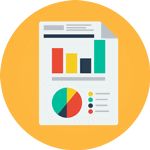 Statistical analysis tests play a vital role in research, especially in the field of social sciences. It helps to analyze and draw meaningful insights from data. However, conducting these tests can be difficult, especially for students who are working on their thesis. The statistical analysis can be complex, and the technical aspects of the tests can be challenging to understand. It is important to have a clear understanding of the statistical ordeals and follow a structured approach to analyze the collected or provided data. We will outline several tips to help students with statistical data tests in their thesis. These tips include understanding the purpose of the tests, choosing the right software for analyzing data, cleaning and organizing data, checking assumptions, interpreting results, seeking help if needed, and practicing. By following the tips provided by our experts, students can ensure the accuracy and reliability of their results and draw meaningful insights from their research data.
Statistical analysis tests play a vital role in research, especially in the field of social sciences. It helps to analyze and draw meaningful insights from data. However, conducting these tests can be difficult, especially for students who are working on their thesis. The statistical analysis can be complex, and the technical aspects of the tests can be challenging to understand. It is important to have a clear understanding of the statistical ordeals and follow a structured approach to analyze the collected or provided data. We will outline several tips to help students with statistical data tests in their thesis. These tips include understanding the purpose of the tests, choosing the right software for analyzing data, cleaning and organizing data, checking assumptions, interpreting results, seeking help if needed, and practicing. By following the tips provided by our experts, students can ensure the accuracy and reliability of their results and draw meaningful insights from their research data.
The IDeal Techniques for Conducting an Analytical Test for Thesis Data
- Understand the purpose of tests: There are different tests for different types of data and research questions. For example, if you want to compare means between two groups, you can use a t-test. Similarly, if you want to see the relationship between two variables, you can use correlation or regression analysis. Understanding the purpose of each test will help you choose the appropriate test for your research question.
- Choose the right software: There are many software packages available, such as SPSS, R, and Stata, and each software has its advantages and disadvantages. For example, SPSS is user-friendly and has a graphical interface, while R is more flexible and customizable. It is important to choose the software that best suits your needs and level of expertise.
- Clean and organize your data: Before conducting any statistical tests, it is important to systematize your data, which includes checking for missing values, outliers, and inconsistencies. When you seek help with a statistical data test in a thesis, we ensure that your data is in the correct format for the software you are using to make sure that your results are accurate and reliable.
- Check assumptions of the statistical test: Most of these tests are based on certain assumptions; thus, it is important to check these assumptions before conducting any test. For example, the t-test assumes that the data is normally distributed and has equal variances. If these assumptions are not met, the results of the test may not be accurate. We help in checking assumptions to choose the appropriate test and interpret the results correctly.
- Interpret the results of the statistical test: It is important to understand the meaning of the statistical output and what it tells you about your research question. You should also consider the effect size, which tells you the magnitude of the relationship or difference between variables. Interpretation should be done in the context of your research question and literature review.
- Seek help if needed: They can be complex and difficult to understand, especially for students who are new to statistics; hence, it is important to seek help if you are struggling with statistical tests. This can be done by consulting your supervisor, our professional tutors, or an online forum to ensure accuracy and reliability.
- Practice: Like any other skill, statistical analysis requires practice, which can help you build your skills and confidence in statistical analysis, whereby you can use online resources such as tutorials and practice datasets to improve your skills.
Statistical analysis is an important tool for drawing meaningful insights and conclusions from data. However, it can be intimidating, especially for students working on their thesis. Understanding the purpose of statistical tests, choosing the right software, cleaning and organizing data, checking assumptions, interpreting results, seeking help from us if needed, and practicing are some tips to help with data tests. By following these tips, you can conduct an authentic and reliable statistical analysis test for your thesis.
Pay Someone to Do Thesis Data Analytical Tests – Skilled Helpers
 Statistical tests are a critical component of thesis research, providing researchers with the means to analyze data and draw meaningful conclusions. However, the process of conducting these tests can be complex and time-consuming, requiring proficiency in statistical methodologies and analysis software. For students juggling multiple academic commitments, finding the necessary time and expertise to perform these tests in their theses can be challenging. In such cases, hiring a professional statistician to handle this task becomes a viable option. We will explore the concept of paying someone for help with such tests, specifically focusing on statistical practices. We will look into when it becomes necessary to perform these tests in a thesis, discuss the potential benefits of outsourcing this task to experts, examine the time considerations involved in conducting these statistical ordeals, and explore the cost implications of hiring our professionals for thesis data testing. Understanding these aspects can help students make informed decisions about seeking external assistance from us for their statistical facts testing needs, ensuring accurate and efficient analysis for their research projects.
Statistical tests are a critical component of thesis research, providing researchers with the means to analyze data and draw meaningful conclusions. However, the process of conducting these tests can be complex and time-consuming, requiring proficiency in statistical methodologies and analysis software. For students juggling multiple academic commitments, finding the necessary time and expertise to perform these tests in their theses can be challenging. In such cases, hiring a professional statistician to handle this task becomes a viable option. We will explore the concept of paying someone for help with such tests, specifically focusing on statistical practices. We will look into when it becomes necessary to perform these tests in a thesis, discuss the potential benefits of outsourcing this task to experts, examine the time considerations involved in conducting these statistical ordeals, and explore the cost implications of hiring our professionals for thesis data testing. Understanding these aspects can help students make informed decisions about seeking external assistance from us for their statistical facts testing needs, ensuring accurate and efficient analysis for their research projects.
When do you need to perform a statistical test for your thesis data?
- Hypothesis Testing: Statistical data tests are crucial for evaluating hypotheses proposed in research studies as they allow researchers to analyze data using appropriate statistical methods, enabling them to determine the significance of their findings and draw meaningful conclusions.
- Comparing Variables: When examining the relationship between two or more variables, the tests help establish if there is a significant association or difference between them. Examples include comparing means across different groups or assessing correlations between variables.
- Testing Models: In fields like economics, psychology, and social sciences, researchers often develop models to explain complex phenomena. You can pay someone to do thesis data analytical tests, like our experts, who can use these tests to assess the goodness of fit of these models, helping you validate or refine your theoretical frameworks.
How long does it take to conduct a test on thesis statistical data?
How much does it cost to pay someone to run thesis data analysis tests?
The cost of hiring someone to perform study tests for your thesis can vary based on several factors. The complexity of your data analysis requirements will impact the cost since more complex tests or large datasets may require additional time and expertise, thereby increasing the overall cost. The level of expertise and experience of the professional you hire will influence the cost, as highly qualified analysts with advanced degrees and significant experience may charge higher rates. Urgency can impact the cost of hiring an expert, since if you require quick turnaround times, it may entail higher charges due to the need for immediate attention and prioritization of your project. It is recommended to reach out to professionals or service providers to obtain accurate cost estimates for your specific research project. Prices can vary significantly based on market rates, geographical location, the complexity of analysis, and the professional's qualifications.
Tests on the statistical data of a thesis form an integral part of the research, providing valuable insights and supporting hypotheses. Understanding when these tests are necessary, the time required for their completion, and the associated costs of outsourcing this task can help researchers make informed decisions and ensure the successful completion of their theses.


 NB: Sometimes we need to first assess your work to quote accordingly. Equally we may highlight a service input review on your placed order to confirm if the paid amount is
NB: Sometimes we need to first assess your work to quote accordingly. Equally we may highlight a service input review on your placed order to confirm if the paid amount is
